#karl zu schwarzenberg
Text
Pride Month is inevitably coming to the end and it’s a real shame that I was unable to make any artistic input during this wonderful time of the year. 🏳️🌈
The only thing I can contribute at last is this drawing which is three months old already but I always struggle with sharing historical ship-content on this account, as it seems inappropriate in a way. 'Cause you know: all the fascinating/gorgeous/serious/funny historical stuff and then that…
It doesn’t really stop me from loving various Napoleonic rare-pairs with all my heart nonetheless. 😔🤲❤️

Disclaimer: Most of historical characters featured on such arts were undoubtedly straight, had wives, kids, mistresses, etc. But ship-dynamic is very real - as always. ✨
#art#history#count’s drawings#metterberg#klemens von metternich#karl zu schwarzenberg#napoleonic era#napoleonic wars#austrian empire#19th century
22 notes
·
View notes
Text
My relations with the Duke of Reichstadt (1/?)
Hey, guys! First of all, happy Murat day!
I know it's a bit contradictory that I'm posting King of Rome content on Murat's birthday, but I can't let go that the King of Rome's bday was the 20th! I wanted to draw something to celebrate it, but instead, I'll leave you with these memories of his best friend; Count Anton Prokesch-Osten about him. Please, forgive some misspelling you could find, since nor german, french or english are my native language! This text was translated from the german to the french, and so, I translate this to the english for you! Hope you enjoy it!
For some context, the King of Rome/Napoleon II is living in Vienna (he started living there at the age of three) at the time this takes place. They refer to him by his title (Duke of Reichstadt) or by "Franz".

The Duke of Reichstadt was then for me, as well as for all circles of Viennese society, one of those appearances that were as attractive as they were endearing. However, I hadn't had a chance to get close to him until then. Now, precisely around this time, my destiny took me to Trieste, then in the midst of the battles where Greece shed its blood in floods on the mainland and on the islands, finally to Constantinople, in Asia Minor, Syria, Egypt and Nubia. After six years of absence, I returned to my native land, where I found a welcome full of kindness and consideration. At that time, when no steamboat had yet sailed the seas of the Levant, voyages to such distant lands, participation in events which, like the struggles of the Greeks against the Turks, had the privilege of exciting minds to the point of higher, they were considered almost as a merit, and reflected a certain brilliance in whoever had achieved them. My native city, Gratz, gave me a particularly flattering reception, when in June 1830, I went there for a few weeks to see relatives and friends, as well as to find these places still filled with the sweetest memories and that had been the theater of my early youth.
At the same time the court also came to reside at Gratz, and on the 22nd of the same month, I had the honor of being invited to the imperial table; placed in front of the Empress, I had the Duke of Reichstadt next to me, seated in front of the Emperor. This handsome and noble young man with deep blue eyes, a masculine forehead, abundant blond hair, silence on his lips, calm and self-possessed in all respects of him, made a truly extraordinary impression on me. I had a feeling similar to the one that comes over a teenager who first meets the young woman to whom he will give his heart. I only exchanged a few shy words with him the whole time we sat at the table; because the Empress and my former protector, Archduke John, were never tired of me telling them what I had seen and learned in foreign countries that we then considered so distant. Much better, after dinner they held me back for several more hours, and when I was finally allowed to retire, the Duke of Reichstadt barely had time to throw these few words at me:
"You've known me for a long time," and he squeezed my hand as if we were old friends.
This handshake was, in fact, a promise for the future. It could only have been given in this sense, and I did not attribute any other idea to it.
The next morning Count Maurice Dietrichstein, to whom the Duke's education was entrusted, came to my house. The count had shown me kindness from the moment that the favor of the princely house of Schwarzenberg had supported me. He reiterated the reproach already formulated the day before, namely, that, although he had been in the same city for a week, he had neglected the duke. The count offered to take me to the young prince at the same moment. I followed him with pleasure. At my entrance, the duke, whose attitude was not at all like that of the day before, rushed towards me with all the petulance of youth, his look animated and full of confidence. Repeating the words of the previous day, he exclaimed:
"You have known me and I have loved you for a long time. You defended my father's honor at a time when everyone was slandering him at will. I have read his memoirs on the Battle of Waterloo and, to better understand each line, I have translated them twice, first in French and then in Italian.”
I responded in terms inspired by the desire to bond closely with this handsome young man so neglected in this world.
Count Dietrichstein took the conversation to Greece. Expressing the most ardent wishes for prosperity for this people, who are now called to live their own lives again, already the day before, after having dinner with the imperial family, I supported the opinion that, despite the unfavorable conditions resulting from war, anarchy, factions, mismanagement, Greece, if given a prince of a European dynasty as king, and if its organization were not the work of diplomatic insufficiency, would move very rapidly towards a flourishing future. In the presence of Archduke Jean, Count Maurice, Colonel de Werklein, intendant of the Archduchess Maria Luisa, I, taking advantage of a moment when the Duke of Reichstadt was busy elsewhere, slipped into the course of the conversation the idea that the throne of Greece, devoid of claimants since the refusal of the Prince of Coburg, could not be handed over to a more worthy than the son of Napoleon: This proposal had received, to my surprise, general approval, The Empress herself, who, during this conversation had approached us, did not seem to oppose it. She had expressed this idea without yet knowing that they were the views of the Prince of Metternich; however, as early as 1825, I became aware of the statement made by this diplomat in St. Petersburg:
"One of two things: either the Greeks will again be subjected to Bonaparte, and given administrative autonomy; or an independent Greece will be constituted in such a way that it will not necessarily be Bonaparte's enemy."
However, Count Maurice had given me the chance to talk about Greece once more that morning, the duke soon guessed my thoughts and caught fire with my words. We were interrupted at that moment by the General Prince of (...). He wanted to say goodbye; however the duke insisted:
"The general," he told me, "he'll only stop for a moment, and I'd be very upset if I lost you soon."
I stayed. The Prince of (...) soon left, rebuffed by the duke's laconicism. So Count Dietrichstein brought up the conversation about Napoleon.
The duke spoke with high spirits. We could feel in each of his words the warmest admiration, the deepest attachment for his father; however, he preferred to rely on his military talents. To take him as a model and thus become a great captain, at this point he was all fire, all flame. We discussed several of the Emperor's maneuvers, including Austerlitz. I was surprised by the prince's strategic judgment and the precision of his expressions. Of all the officers and generals then at Gratz, there was, of course, not one who had the keenest military eye and was endowed with the most pronounced aptitude for command-in-chief. He returned not only to my published account of the Battle of Waterloo, but also to "the memorable events in the life of Field Marshal Prince Charles of Schwarzenberg.
The duke appreciated them with a sagacity that astonished me. Then he complained of his isolation, and poured out his soul in these words:
"Stay with me; sacrifice your future for me, stay with me! We are made to understand each other!"
He expressed himself with such warmth that he touched me to the bottom of my heart. Then he continued:
"If I am called to be another Prince Eugene for Austria, the question I ask myself is this: how will it be possible for me to prepare myself for this role? I feel indecisive in choosing a man capable of introducing me to the high demands and noble duties of the military career. I do not have and do not see any man of this merit in my entourage."
Count Dietrichstein witnessed this departure, and seemed to find it natural and fair. I reproached the duke, cordially shaking his hand, for judging too hastily. He accepted my guilt without taking offense and listened deferentially when I expressed the doubt he felt about my ability. Our interview was interrupted by the General Count of Leiningen, whom I could not refuse to receive. But, once again, he did not let me go, and as soon as the count left, he resumed the conversation about his father's feats of arms.
As it was necessary to pay my respects to his mother, the Archduchess Maria Luisa, I could hardly delay any longer; I warned him about it and said goodbye to him. I had been at the archduchess's for barely half an hour when the duke went there in the same manner. His mother received him tenderly; he kissed her with a rather serious air. The conversation focused on his childhood. He wanted her to give him more precise information about Colonel Sèves, who had accompanied him from Paris to Blois in March 1814, and whom he had met in April 1828 in Modon, at Ibrahim-Pasha's house. I had to tell him what the colonel had taught me about this fatal escape.
We perceived each other as two men who were convinced that nothing could separate them.
Source:
Mes relations avec le duc de Reichstadt : mémoire posthume / par le comte de Prokesch-Osten,. . . ; traduit de l’allemand [par A. de Prokesch-Osten fils]. Gallica. https://gallica.bnf.fr/ark:/12148/bpt6k6536278r/f38.item.zoom
#napoleon ii#klemens von metternich#l'aiglon#karl zu schwarzenberg#the king of rome#memoirs#anton prokesch-osten#duke of reichstadt
35 notes
·
View notes
Photo
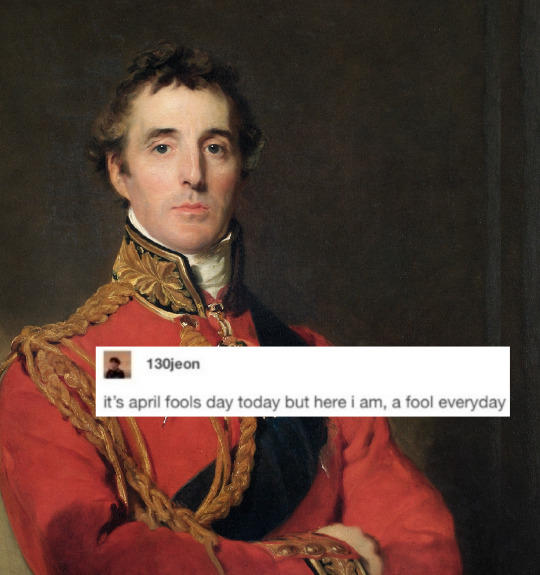



Part 2 of 3
#history meme#Napoleonic Wars#Duke of Wellington#Arthur Wellesley#General Blücher#Karl Phillipp zu Schwarzenberg#Fürst Metternich#I think the last two are very not-canon#sorry about that I don't know a lot about the dads of the sidekick-squad
66 notes
·
View notes
Text
I was once reading a Japanese biography written about Metternich.
In that book, there was also a little bit about Schwarzenberg, who was Metternich's "confidant".
I will try to find out more about this relationship………🤔
18 notes
·
View notes
Text
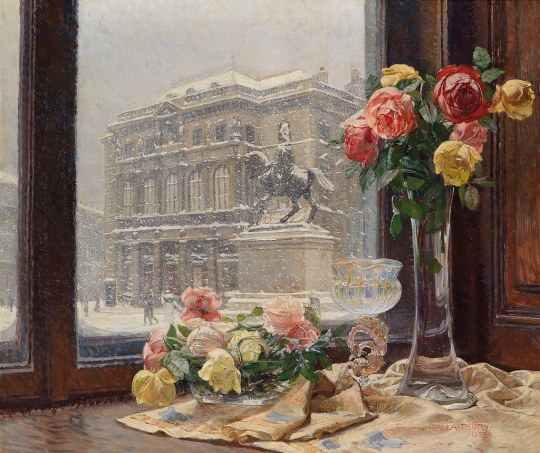
Paula Thury - View of the Former Officers’ Mess and the Monument to Karl Philipp Fürst zu Schwarzenberg on Schwarzenbergplatz (1903)
287 notes
·
View notes
Text
On this day in Wikipedia: Sunday, 15th October
Welcome, שלום, Dzień dobry, こんにちは 🤗
What does @Wikipedia say about 15th October through the years 🏛️📜🗓️?

15th October 2021 🗓️ : Death - David Amess
David Amess, British politician, member of Parliament for Southend West (b. 1952)
"Sir David Anthony Andrew Amess ( AY-miss; 26 March 1952 – 15 October 2021) was a British politician who served as Member of Parliament (MP) for Southend West from 1997 until his murder in 2021. He previously served as MP for Basildon from 1983 to 1997. A member of the Conservative Party, he was a..."

Image licensed under CC BY 3.0? by Richard Townshend
15th October 2018 🗓️ : Event - Kidnapping of Jayme Closs
Thirteen-year-old Jayme Closs was kidnapped from her home in Barron, Wisconsin, and held captive for 88 days.
"On October 15, 2018, 21-year-old Jake Thomas Patterson abducted 13-year-old Jayme Lynn Closs from her family's home in Barron, Wisconsin. The attack took place at 12:53 a.m. after he forced his way inside and fatally shot her parents. Patterson took Closs to a house 70 miles (110 km) away in rural..."
15th October 2013 🗓️ : Event - 2013 Bohol earthquake
A 7.2-magnitude earthquake struck Bohol in the Philippines, resulting in 222 deaths.
"The 2013 Bohol earthquake occurred on October 15 at 8:12:31 PST in Bohol, an island province located in Central Visayas, Philippines. The magnitude of the earthquake was recorded at Mw 7.2, with epicenter 6 kilometres (3.7 mi) S 24° W of Sagbayan, and its depth of focus was 12 kilometres (7.5 mi)...."

Image licensed under CC BY-SA 3.0? by P199
15th October 1973 🗓️ : Birth - Aleksandr Filimonov
Aleksandr Filimonov, Russian footballer
"Aleksandr Vladimirovich Filimonov (Russian: Александр Владимирович Филимонов; born 15 October 1973) is a former association football goalkeeper from Russia. He won the 2011 FIFA Beach Soccer World Cup with the Russia national beach soccer team.During his professional career, he was best known for..."
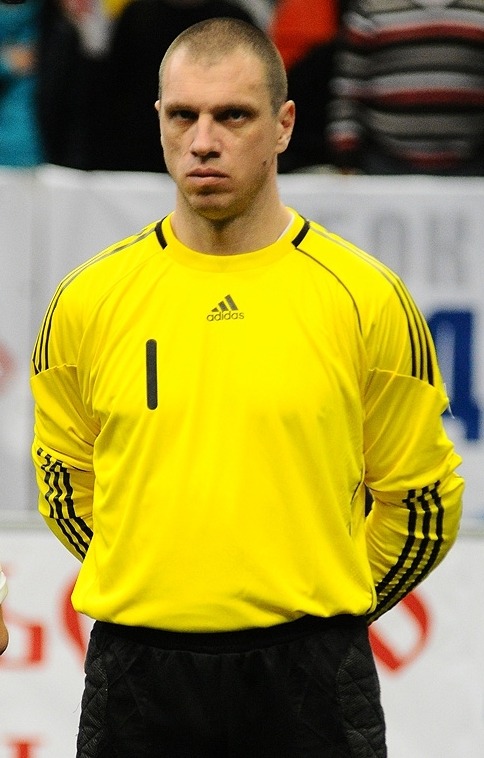
Image licensed under CC BY-SA 1.0? by Dmitry Parshin
15th October 1923 🗓️ : Event - Rentenmark
The German Rentenmark is introduced in Germany to counter hyperinflation in the Weimar Republic.
"The Rentenmark (German: [ˈʁɛntn̩maʁk] ; RM) was a currency issued on 15 October 1923 to stop the hyperinflation of 1922 and 1923 in Weimar Germany, after the previously used "paper" Mark had become almost worthless. It was subdivided into 100 Rentenpfennig and was replaced in 1924 by the Reichsmark...."
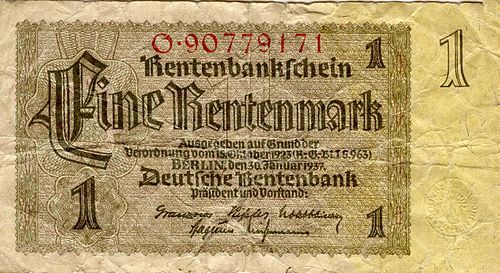
Image licensed under CC BY-SA 4.0? by Drrcs15
15th October 1820 🗓️ : Death - Karl Philipp, Prince of Schwarzenberg
Karl Philipp, Prince of Schwarzenberg (b. 1771)
"Karl Philipp, Fürst zu Schwarzenberg (or Charles Philip, Prince of Schwarzenberg; 18/19 April 1771 – 15 October 1820) was an Austrian Generalissimo and former Field Marshal. He first entered military service in 1788 and fought against the Turks. During the French Revolutionary War, he fought on the..."

Image by Unidentified painter
15th October 🗓️ : Holiday - Shwmae Su'mae Day (Wales)
"Shwmae Sumae Day (Welsh: Diwrnod Shwmae Sumae) is a day marked each year in Wales to celebrate and promote the Welsh language. Shwmae and Sumae are informal greetings used in the south and the north respectively to start a conversation. The day is celebrated on 15 October each year in order to..."
0 notes
Text
IN HALLE NEUSTADT GAB ES ALLES!



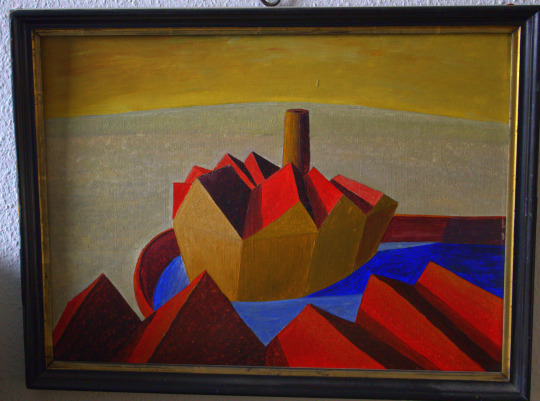
Ein Freund, Achim Treskow, ein Bauingenieur machte mich um 1994 auf den >>>ZAK<<< aufmerksam. Der Zentrale Artikelkatalog der Volkswirtschaft der DDR, kurz ZAK genannt, war ein mehr bändiger Katalog, der jedem Industrieerzeugnis der DDR eine Kennnummer zuordnete und es damit für andere Betriebe und Einrichtungen eindeutig bestellbar machte.
Mehrere Kilos davon würden in einem kleinem Büro im II.WK hinter dem BAZ, dem Bauarbeiterzentrum stehen. Ich sollte eine Tüte Mona Kaffee besorgen und mich bei einer Ilse melden. Ich war telefonisch avisiert und meldete mich bei "Ilse"! Ilse war ca. 30 Jahre alt, geschieden, der Mann, ein Architekt, war nach dem Westen abgehauen. Ilse, 90/60/90, eine Bauzeichnerin stammte aus Dresden und meinte "nu - nu haste mir keine Rostbratwurscht mit gebracht?" Achim hatte ihr verklickert, ich wäre aus Thüringen und kenne mich mit gebrühter und ungebrühter Rostbratwurst aus. Nachdem ich ihr erklärt hatte, das ungebrühte Bratwurscht essen aus Thüringen wegen der Hackfleischverordnungen nur mit exaktem Timing gegen Wochenende funktioniert, erklärte mir die Ilse den ZAK fast eine Stunde als Einleitung, nachdem sie den Kaffee im Schoß mit einer Handmühle gemahlen hatte. Ich spähte ihr in den riesigen Ausschnitt und sah andächtig beim Kaffee mahlen und schlürfen zu. Danach erklärte sie mir den ZAK weiter, sowie wo in Halle weitere Exemplare befindlich sind.
Ilse war inzwischen von einer Bauzeichnerin zu einer Baumaterialien Beschafferin mutiert und kannte so jeden Betrieb der DDR, der irgendwas mit Bauwesen zu tun hatte. Egal ob Mischmaschine, Gerüst, Suppenteller für das BAZ, das Bauarbeiterzentrum, auch damals schon "Dreckiger Löffel" genannt. Ich kannte mich damals mit Achsen, Wellen, Lager, Kupplungen aus und wusste auch, wo es Pumpen, Verdichter, Getriebe und Armaturen gibt. Ilse hatte nur den halben ZAK, also 240 Bände. Noch interessanter war aber, Ilse wohnte im gleichen Block wie ich, nur am anderen Ende in der 3.Etage.
Sie hatte die gleichen Probleme, wie ich damals, nämlich ein hormonelles Defizit! Ich hatte zu viel der Testosterone und Ilse hatte deutlich zu wenig. Fakt war, nach einem Schwof im BAZ landete ich bei Ilse im monatelang unbenutzt doppelt belegtem Doppelbett zum Zwecke des Austausches von Körperflüssigkeiten.
In den Entspannungsphasen des außerehelichen Geschlechtsverkehrs schwatzte ich, um mich interessant zu machen, allen möglichen Kram über meine seltsamen Hobbys. Ich sammelte damals Kunst und Kunstgewerbe und handelte schwarz mit Antiquitäten. Einen Professor Dr. Scheiding in Weimar kannte ich, der wollte das Bauhaus wieder in Weimar aktivieren. Da kam er um 1972 bei den der Entscheidung mächtigen Genossen aber noch nicht gut an. Das Bauhaus Weimar war damals in den Augen vieler namhafter Nomenklaturkader-Genossen einfach nur imperialistisches Teufelszeug. Aber Zeiten ändern sich so auch die Meinungen der "Genossen". Ich hatte zu einer Gruppe von Leuten in Weimar Kontakt, die in das Bauhaus vernarrt waren.
Denn, es gab in Weimar seit 1923 das Musterhaus am "Am Horn". Das Musterhaus ist das einzige in Weimar fertiggestellte Flachdach-Zeugnis des Bauhauses. Seit 1973 ist das Gebäude ein Baudenkmal. Irgendwelche Leute fanden so einen Kasten im Bungalowstil aber auch schick und wollten auch so ein Haus bauen. Damals war aber in der DDR das Satteldach EW 58 Mode, mutmaßlich von Einfamilienwohnung , war ein standardisierter Eigenheimtyp aus der DDR für 4 bis 6 Bewohner, der als Prototyp Pate für eine Vielzahl von weiteren Eigenheimtypen stand. Der Entwurf wurde vom VEB Landbaukombinat Karl-Marx-Stadt in Schwarzenberg projektiert und ging maßgeblich auf die Arbeit des Architekten Wilfried Stallknecht zurück.
Dann gab es noch den DDR Eigenheim Typ HB1 – eine Holzbetonbude aus Schköna, wo man ein Flachdach oben drauf organisieren konnte und noch feiner war das DDR Eigenheim Typ KH1 Keramikhaus, Einzel- oder Reihenhaus für 6 bis 8 Personen aus Halle. (VEB Ziegelwerke Halle) So 79 520 DDR Mark kostete das gute Stück. Der Leistungsanteil des Herstellers, also der Holzbetonplatten war 22 660 Mark!
Was hat da aber jetzt die Ilse damit zu tun? Ganz einfach, die Ilse war eine absolut professionelle Baumaterialien Beschafferin und wusste, das so 100 Tonnen aussortierte Bauelemente, speziell Außenwandelemente im Plattenwerk Halle-Neustadt als quasi Ausschuss hochkant gestapelt waren. Für einen Elfgeschosser konnten die Elemente für 2400 DDR Mark nicht freigegeben werden, für den eingeschossigen Bungalow waren sie wie geschaffen. Nur, die Elemente standen nicht im ZAK, denn Ausschuss gab es dort nicht. Mit dieser Information aus Ilses Doppelbett fuhr ich nach Weimar mit der Kunde, ich weis, wo Flachdachhaus-Außenwandelemente nutzlos in der Gegend bei Halle-Neustadt herum stehen. Niemand glaubte mir, bis ich mit Fotos als Beleg aufkreuzte. Und ich hatte Ilses Telefonnummer dabei!
Eigentlich sollten die Außenwandelemente für den Straßenbau geschreddert werden. Das kostet viel DDR Geld. Abholen lassen für ein paar Mark bringt Geld! Ilse hatte wegen ihrem geflüchtetem Mann noch Kontakte zu pfiffigen Architekten, die diese Platten einfach gegen die Holzbetonplatten aus tauschten. Freie LKW - Transportkapazität gab es am Samstag und Sonntag in Halle-Neustadt!.
Und so rollten Mitte/Ende 1975 die Außenwandelemente aus Halle-Neustadt in das Weimarer Land und das Musterhaus am "Am Horn" feierte fröhliche Urständ! Irgendjemand besorgte mir damals eine Kühltasche, mit der ich in Weimar bei einem Fleischer 20 Kilo ungebrühte Rostbratwürste an einem Freitag nach Halle kutschte. Die Würschte brauchte ich nicht zu bezahlen. Die waren schon bezahlt ;-) Ich hatte kein Auto und musste die Bratwürste mit einem Kinderwagen im Zug nach Halle-Neustadt transportieren. Als mir jemand half, den Wagen in den Zug zu wuchten, stöhnte er, was ich da für ein fettes Baby im Wagen hätte. Am gleichen Abend duftete es auf Ilses Balkon nach Thüringer Rostbratwurst. Ilse futterte zwei Würste ich drei Rostbratwürste aus meiner Heimat. Inzwischen standen in und um Weimar die ersten Außenwandelementwände hochkant. Als der Bauherr gefragt wurde, woher er die Platten her hat, bekam man nur windige Antworten. Niemand verriet, wie man für paar un gebrühte Rostbratwürste und Tausend Mark sich ein halbes Haus besorgen kann!
© Richard Hebstreit 2022
Eigentlich war damals alles total legal. Ich hätte mir mit der Bauteile-Information mir eine goldene Nase verdienen können. Ich habe lediglich die Bratwurscht besorgt und war happy. Erst um 1985 erkannte ich die Wertigkeit von Recycling Produktionssystematiken. Ich kam auf die Idee, aus Edelstahlschrott feinsten Designerschmuck zu produzieren:
und
1 note
·
View note
Text
My part of the trade for @count-lero
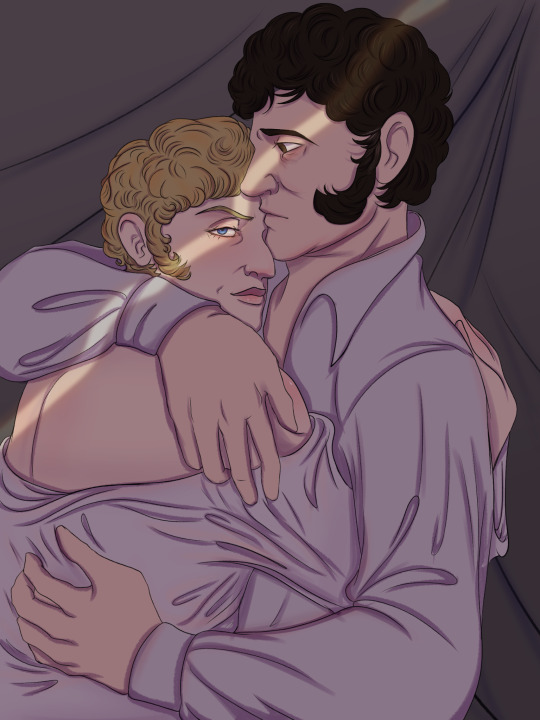
With beautiful reference:
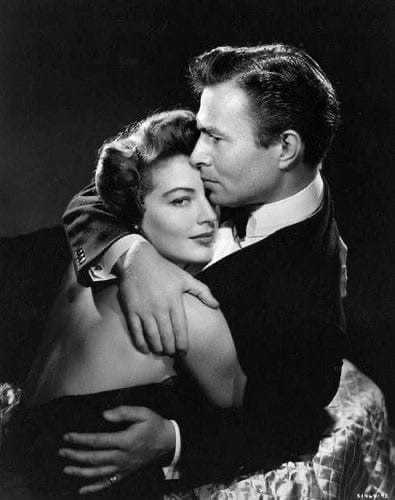
#art#napoleonic#history art#klemens von metternich#metternich#karl zu schwarzenberg#reference#drawing references
31 notes
·
View notes
Text
What are the coalition guys up to in Christmas 2020? (Modern AU!Coalition commanders)
Inspired by my friend @histoireettralala I decided to make a version with the coalition bois, enjoy!
As we know, Bernadotte has decided to be burrito this Christmas and leave his wife and children playing with the snow on their own. But what about the others? Here are some things that they do:
Wellington, being a fan of parties, decided to throw his parties on Zoom, and get all the festive spirits. He and Lord Castlereagh had a great time ranting about the entire chaos that is going on in the UK (trust me, they shared the sentiments of people in the rest of Europe, facepalming over Brexit), also their shared grievances on America. Somehow, they decided to prank call the Cannigites—George Canning was unimpressed. I guess, it’s some Tier 3 fun going on (and Harriet Arbuthnot got the entire footage of this, with Blücher and Tsar Alexander as two of the witnesses).
Meanwhile for Nelson, despite being an “old boomer”, decided to have excessive partying and break all the quarantine rules. ((There are two types of people who live in Tier 3 regions during Christmas.
For Archduke Charles, he already got his anti-epileptic medication ready to survive Christmas. To avoid seizures, any kind of festive lights is forbidden within his household. Despite there were no Christmas markets this year due to an event ban, he and his family have a great time together. Of course, he also gave his kids got the best presents on Saint Nicholas’ Day.
Meanwhile, besides opening advent calendars, decorating the Christmas tree and giving out presents on Saint Nicholas’ Day, Karl Philipp zu Schwarzenberg already got the Christmas carp for his family. They have decided to release the fish into the river nearby on Christmas Eve.
Like all the other Austrians (*and Hungarians) and Germans, the Archduke and Schwarzenberg were found sitting at the couch watching “Sissi” during Christmas with their families.
Bonus: Empress Sisi herself was half-impressed, half-unimpressed on the movies (*well, Franz Joseph suggested this since they are now stuck together)—but heyyyy at least this is NOT the monstrosity of the books written by a certain American author who decided to make her having an affair with her BFF Gyula. By the way, when she’s left alone (finally), she had a nice zoom call with her friends and family (especially her little bro Gackl) just to rant about how she’s not able to go anywhere, despite she is still allowed to work out at home and go out for a walk every day under the pandemic.
Sadly, the Russians have their Christmas in January so they are not taking a break in December, but you will see a wild Barclay de Tolly blasting out “Auld Lang Syne” on New Year’s Eve (*and an annoyed and drunk Bagration)
That’s all I can think of, have a nice holiday! (And hopefully all the Christmas cards will arrive before Christmas🥺)
#coalition bois#featuring#a tired Sisi who just wanted to be left alone this Christmas#and a Franz Joseph who has been trying to keep everything together#also Lord Castlereagh being best bros with Atty#and an unamused Canning#arthur wellesley#duke of wellington#robert stewart#lord castlereagh#viscount castlereagh#george canning#regency bitches#sassy atty#horatio nelson#archduke Charles#karl philipp zu schwarzenberg#mikhail barclay de tolly#pyotr bagration#empress sisi#empress elisabeth#elisabeth of austria#elisabeth of bavaria#been fantasising Wellington and Castlereagh as ordinary teenage boys#the carp thing was a bohemian Christmas tradition and I hope I did not get it wrong😅#and watching Sissi movies is a modern Christmas tradition in the German-speaking world😄#btw got to expand my knowledge on French Christmas traditions so that I can write more of the marshal Christmas headcanons lol#Sisi would you like to trade lives with me in Sheffield? oh wait never mind I got an annoying neighbour#R.I.P. me I am stuck in Christmas ;-;#Franzi really tried hard to impress his wife on her birthday...
12 notes
·
View notes
Text
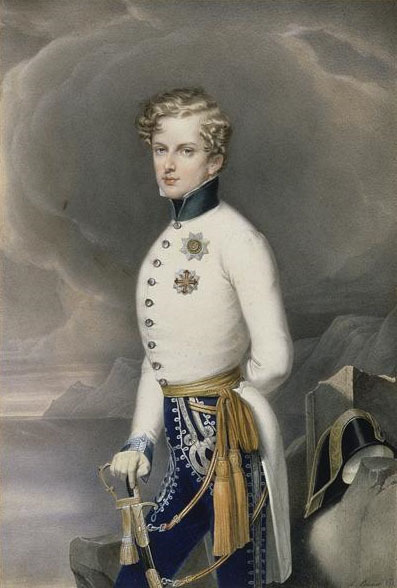
These are excerpts from »Mein Verhältnis zum Herzog von Reichstadt« by Ritter Anton Prokesch von Osten. This gentleman, fifteen years older than Franz von Reichstadt and apparently a bit of an adventurer but with excellent diplomatic skills, had made a name for himself in fighting for the unification of Greece and in the Levante, services for which he had recently been knighted. He had also, already in his youth, written several books full of appraisal for Napoleon, one about the battle of Waterloo. Recently returned to Austria, he was staying in Graz in June 1830, when he first made the acquaintance of the Duke of Reichstadt:
At that time the court also went there and on the 22nd I had the honour of being called to the imperial table. I sat opposite the Empress and had the Duke of Reichstadt, who sat opposite the Emperor, at my side. […]
Okay, let’s just stop here already for a second. So, at this official court event Franz sits
at the family table
and vis-à-vis his grandfather the Emperor (a place of honour).
This does not sound like isolation or mistreatment to me. In a letter to Austrian politician Gentz Prokesch even mentions that the evening before, when the emperor and his family appeared at the theater, the Duke of Reichstadt had been greeted by some with shouts of »Vivat Napoleon«. And this, as Prokesch states, »quite innocently«, i.e., without giving it much thought. Apparently nobody bothered about political implications.
During the imperial dinner that Prokesch was invited to, he did not have much occasion to chat with Franz, for once because arch-duke Johann talked too much, but also because Franz definitely held back at this public occasion and was not very approachable. He did shake Prokesch’s hand however, when Prokesch took his leave, and told him that he had known him for a long time already (i.e., that he had read his books).
On the morning after this day, Count Moritz Dietrichstein, who had been entrusted with the Duke's education, and a man who had been well-disposed towards me from the time when I had been carried by the favour of the House of Prince Schwarzenberg, came to me in order to renew the complaint he had already levelled at me yesterday, namely that, although I had been in the same city with the Duke for a week, I had neglected him. He invited me to go straight to him.
So, let’s recapitulate: The evil obusive reactionary instructor himself calls upon a known admirer of Napoleon in order to get him to make the acquaintance of his student.
I followed him with pleasure. When I entered, the Duke, a different man in his bearing from the day before, met me with all the swiftness of youth and with an expression full of confidence and warmth. Repeating the words of yesterday, he said: "I have known you and loved you for a long time. You have defended my father's honour at a time when all was racing to scorn him. I have read your Battle of Waterloo and, in order to absorb every line in it, I have translated it twice into other languages, into French and Italian." I answered what the desire to captivate the handsome young man, so unique in the world, made me say. Count Dietrichstein first brought the conversation to Greece. Full of best wishes for this country now called to its own life, I had already expressed the opinion yesterday, after the imperial dinner, that despite the evils arising from war, lawlessness, factionalism and misgovernment, Greece would quickly blossom into a happy future if a European prince was given to it as king and if it were not governed with diplomatic half-measures. To the Archduke Johann, to Count Moritz [i.e. Dietrichstein], to the principal of the Archduchess Marie Luise, to Colonel von Werklein, I had, at a moment when the Duke was otherwise engaged, suggested that the Greek throne, which had lacked a claimant since the rejection of the Prince of Coburg, could be given to no one more worthy than the son of Napoleon, and to my surprise this suggestion had met with applause. Even the Empress, who had come to us during this conversation, did not seem averse to it. [...]
Now Count Dietrichstein turned the conversation onto Napoleon.
Again: It is Dietrichstein himself who brings in the alleged hot potato. And apparently, Franz has no fear to talk about the topic in his governor’s presence:
The Duke spoke in great excitement. - The warmest admiration for his father, the most passionate attachment was in the Duke's every word. But he dwelt chiefly on the latter's military talents. To train himself as a general according to this pattern was something he was passionate about down to his fingertips. We discussed several of his manoeuvres, for example that of Austerlitz. I was amazed at the Prince's strategic judgement and the firmness of his expression. Among all the officers and generals present in Graz at that time, there was certainly not one with such a sharp military eye and so resolute a disposition towards the commander. He came back to my Battle of Waterloo, but also to my "Memories from the Life of Field Marshal Prince Karl zu Schwarzenberg". The Duke discussed these with a tact that surprised me. He then complained about his loneliness and burst into the words: "Stay with me! Make the sacrifice of your future, stay with me! We, we would understand each other!" He spoke this with a warmth that penetrated my heart. Then he continued: "If it is my destiny to become a Prince Eugene for Austria, I ask myself how to train myself for this role? I have to choose a man who can introduce me to the higher demands and tasks of war; I have and see no such man in my surroundings." Count Dietrichstein witnessed this statement and seemed to find it natural and approve of it.
Dietrichstein then leaves the two to themselves for a while, and Franz noticeably opens up even more and talks about his present situation at court and his plans for the future.
"[...] If it is my doom never to return to France, I am serious about my desire to become another Prince Eugene for Austria. I love my grandfather - I am a piece of his house and will gladly draw the sword for Austria against anyone but France." He laid down these words like a confession in my soul, and so I took them.
A bit later, Prokesch repeats how close the relationship between Reichstadt and his grandfather was:
[...] He loved his grandfather with the love of a child, for from the day he was brought to Vienna he had found in him the tenderness of a father. At that time he was given a playground in the emperor's rooms - did not leave his side for half a day, ate with him when the emperor ate alone, shared his stays in the country with him and grew up with him like a branch grafted onto a foreign trunk. He told me this, but added: that he would not forget for a moment who he was born and where his father was decaying. […]
Again – this does not sound like »isolation« to me.
Out of interest to those who are familiar with the books by Aubry and Castelot: How do they treat these informations? I understand Prokesch is generally accepted as one of Reichstadt's true friends? Or is there reason to question the truth of his statements?
I guess what I'm trying to say is: Let's be fair and hear both sides before jumping to conclusions. Just because Dietrichstein was – by modern standards – a horrible pedagogue does not mean he was automatically wrong in his assessment of Franz’s character traits. Proksch actually seems to confirm some of it. Just because »l’Aiglon« had a tragic fate does not mean he was automatically a saint.
43 notes
·
View notes
Text
Re-upload in hope that somebody is going to notice and appreciate someone’s hard work.
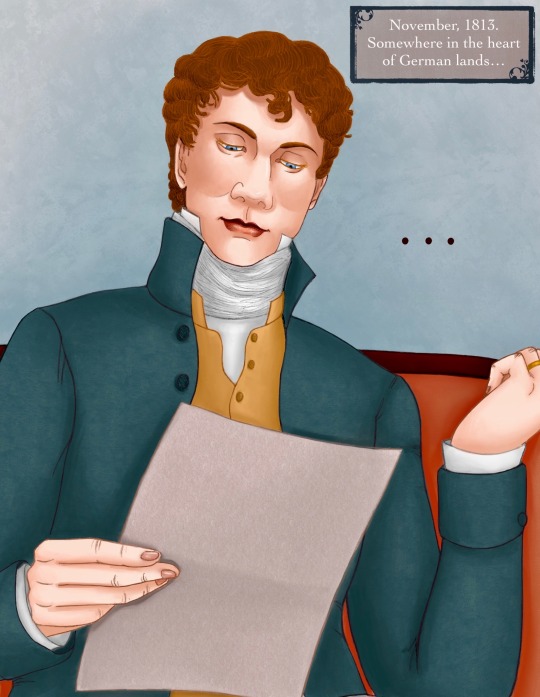
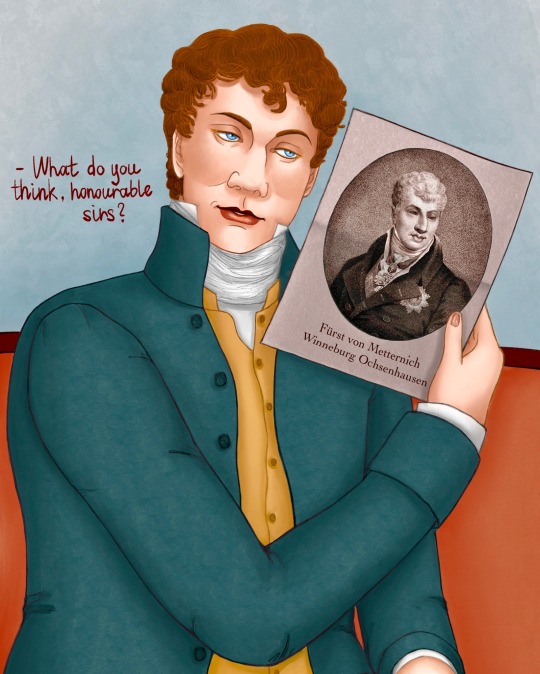
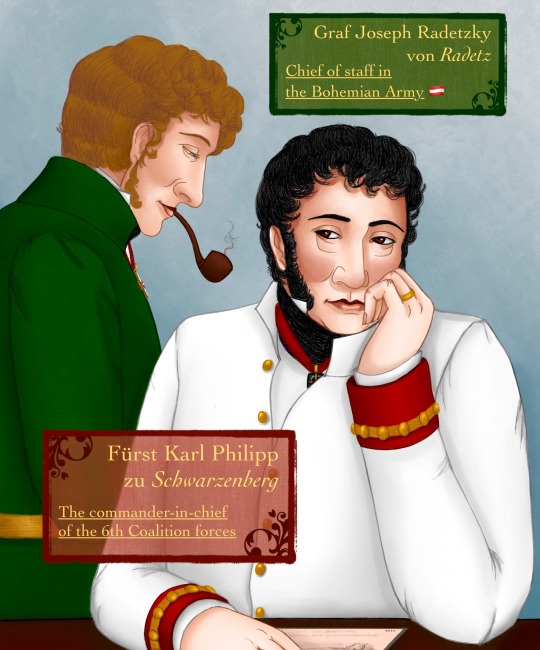
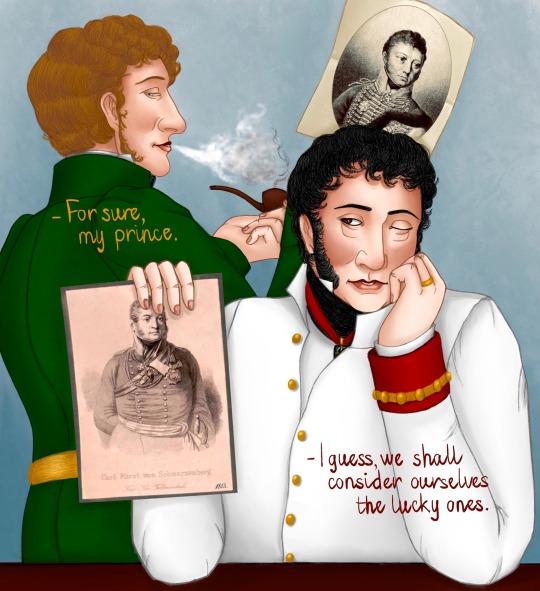
A comics illustrating specific passage from Metternich’s dual biography with Wilhelmina, Duchess of Sagan.
Metternich's picture is now on public sale at Artaria in the Kohlmarkt, between portraits of Schwarzenberg and of Wellington. Her father is quite a hero, Marie [the eldest child of Klemens and his first wife Eleonore] writes, adding, "Everybody is buying it, and a huge crowd of people are always standing in front of this window." It is not a terribly good likeness; there is a leer in the right eye and Metternich when he sees it declares, "Next time I have my portrait made, it will be without any eyes at all."
#count’s drawings#art#history meme#klemens von metternich#karl zu schwarzenberg#joseph radetzky#napoleonic era#napoleonic wars#austrian empire#19th century
39 notes
·
View notes
Text
A dysfunctional austrian family
Hi!
I recently saw my drawing of Klemens, Schwarzenberg and L'Aiglon on Twitter, and I thought it's been a while since that, so I saw myself forced to do an update :D

(the drawing itself)
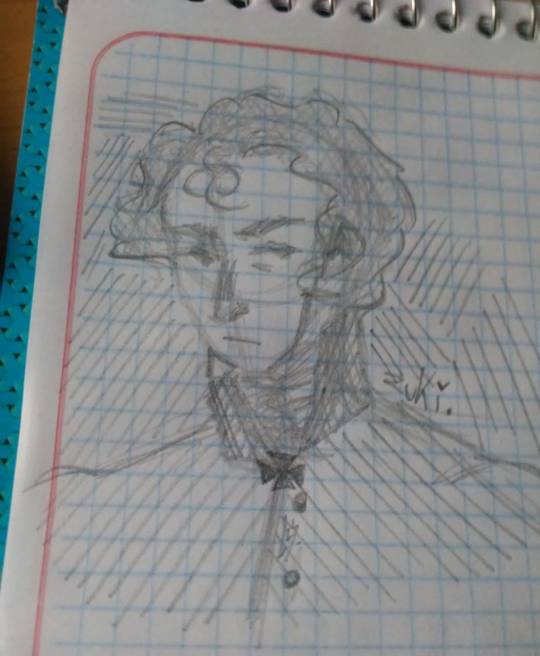


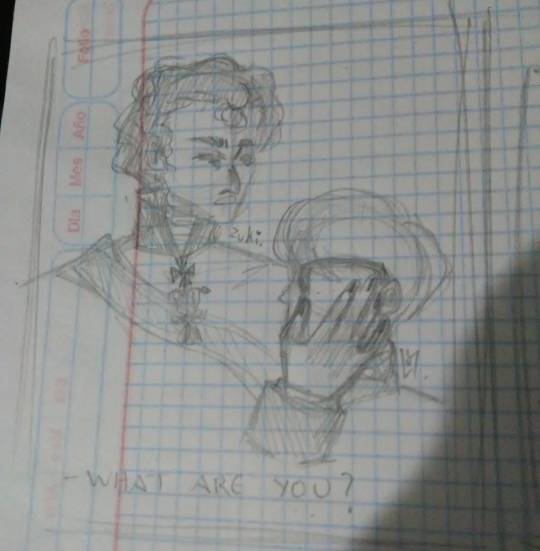


(reference)
#klemens von metternich#karl zu schwarzenberg#napoleon ii#l'aiglon#ik theyre all blurry but im way too lazy to fix it sorry lov ya
21 notes
·
View notes
Photo

#history meme#Napoleonic Wars#Joséphine de Beauharnais#Fürst Metternich#Jean Baptiste Bernadotte#Karl XIV. Johann#Arthur Wellesley#Duke Of Wellington#Frederick William III.#Alexander I.#Napoleon Bonaparte#Francis II.#General Blücher#Queen Luise#Karl Phillipp zu Schwarzenberg#Joachim Murat#I had to add the last three because I wanted to use them all...
98 notes
·
View notes
Text
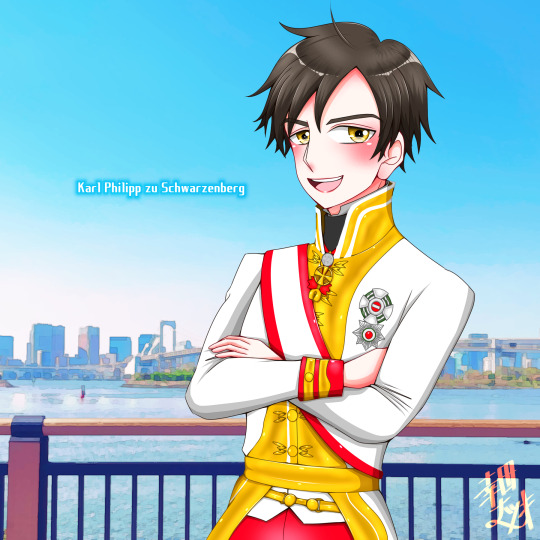
Karl✧*。
8 notes
·
View notes
Note
minor german catholic royalty/nobility are great value for absolutely batshit names. e.g. Johannes, Hereditary Prince of Schwarzenberg (born 1967) has the full name of Johannes Nepomucenus Andreas Heinrich Joseph Karl Ferdinand Johannes Evangelist die Heiligen Drei Könige Achaz Michael Maria. and then there's the surnames... "Oettingen-Oettingen and Oettingen-Wallerstein", "Schaffgotsch genannt Semperfrei von und zu Kynast und Greiffenstein". imagine filling out a form.
Damnit I was planning to call my child Johannes Nepomucenus Andreas Heinrich Joseph Karl Ferdinand Johannes Evangelist die Heiligen Drei Könige Achaz Michael Maria but now everyone will think I’m copying him!
#ok but does he have the first name johannes and the middle name johannes?#is he the royal version of moon moon?#ask#qvietbatpeople#deposed royal families
21 notes
·
View notes
Text

"Siegesmeldung nach der Schlacht bei Leipzig 1813", ein Gemälde datiert 1839 von Peter Krafft (1780-1856). Das Gemälde zeigt den österreichischen Feldherrn Karl Philipp Fürst zu Schwarzenberg, der die Hauptarmee mit 250.000 Mann befehligte, während der Überbringung der Siegesmeldung an die verbündeten Monarchen, Kaiser Alexander I. Pawlowitsch von Rußland, Kaiser Franz I. von Österreich und König Friedrich Wilhelm III. von Preußen. Nach der vernichtenden Niederlage in der Völkerschlacht bei Leipzig in 1813 wurde Kaiser Napoléon I. von Frankreich in schweren Kämpfen zum Rückzug nach Frankreich und anschließender Kapitulation und Abdankung gezwungen.

1 note
·
View note